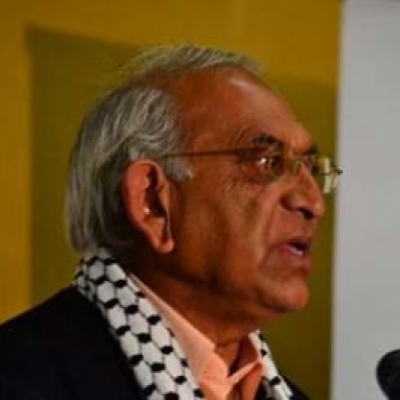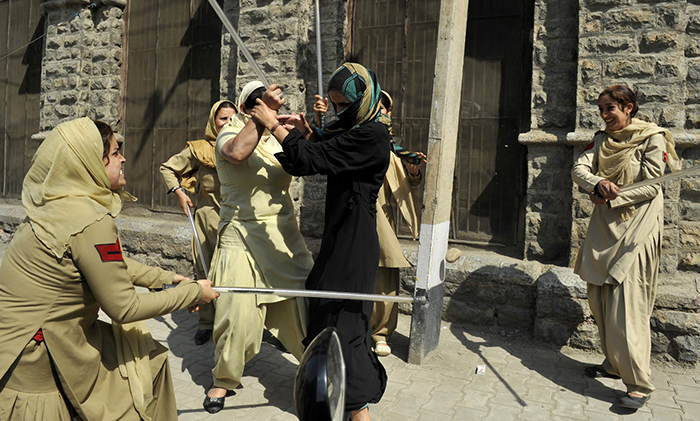



 Iqbal Jassat
Iqbal JassatGenerations of Kashmir’s population have waited in vain for an end to India’s brutal military occupation and to celebrate their independence — finally as free people. Alas, seven decades have passed and the deep-felt desire to stand proudly alongside free peoples of the world remains as elusive as ever.
Seventy years of struggle for the right to determine their own future free from India’s brutal occupation of Kashmir have instead been marred by countless deaths, massacres, rapes, and wanton destruction. And the story line is no different to that of other freedom struggles, whether in the past in South Africa or currently in Palestine. Both in Kashmir and in Palestine, the occupiers have pursued a policy of genocide. The occupiers are thus the villains and the occupied — the Kashmiri people — the victims.
As has been the case in South Africa’s epic battle against apartheid, the perpetrators of crimes, more specifically war crimes, have been repressive state security institutions under the command of the executive.
Palestinians face a similar horrendous situation where the state, a settler colonial regime, remains engaged in what can only be described as a perpetual orgy of ethnic cleansing.
Kashmir and its population are at the receiving end of India’s brutal military. On orders from the powers seated in Delhi, the military has a single goal: crush the dreams of the predominantly Muslim Kashmiris — at any cost! Thus we see the devastation of broken limbs and shattered dreams. And tragically, zero accountability.
Narendra Modi struts the global stage hoping that hobnobbing with the Trumps, Netanyahus, and other fellow right-wingers will enhance his public image as a statesman. Unfortunately for him, his reputation as a warmonger precedes his current position as leader of the world’s “largest democracy.”
Following the Gujarat massacres in February 2002, Modi was placed on America’s list of terrorists and barred from entering the US in 2005. The ban was lifted just before the 2014 elections when it became apparent that his party, the Bharatiya Janata Party (BJP), would win and Modi would become prime minister of India. Overnight, both the United States and the United Nations seemed to erase his deplorable human rights record from memory.
Modi has cultivated an aura of invincibility among millions of his followers. His leadership of the extremist BJP has placed him on a path to reclaim India as Hindustan (the land of Hindus only). This evidently has had a devastating impact in Kashmir and on Muslims in India generally.
The BJP frequently argues that the policies it pursues in colonized Kashmir are no different to that of the Indian Congress. In fact to deflect criticism of their harsh crackdown, Modi and the BJP insist that they are maintaining the same security measures as the previous Indian regimes. Indeed they point to the historic dawn of independence from the British Empire, to justify current militarization of Indian troops in Kashmir.

Though there is a huge gap between Modi and one of the leaders of the independence movement, Jawaharlal Nehru, many historians who have researched the issue of plebiscite on Kashmir, reveal how this fundamental pillar has been manipulated.
Shockingly, Nehru has been fingered as devious, having arrived at an agreement with Pakistan on ple-biscite in January 1949 and a ceasefire, merely “to buy time.” It was Nehru who took the matter to the UN Security Council in January 1949 when the Kashmiris’ uprising backed by tribesmen from Pakistan was about to reclaim the entire Kashmir Valley as well as Jammu (the state is known as Jammu and Kashmir).
The following excerpt by A.G. Noorani, a renowned authority on Kashmir, elucidates the situation,
Nehru had other plans. In private he had adamantly set his face against a plebiscite in 1947. In public, till 1954 he continued to make the most explicit — almost extravagant — and solemn pledge to hold a plebiscite. It was nearly fifty years later, in 1996 that the clue to Nehru’s entire Kashmir policy emerged, with the publication of Volume 22 of the Selected Works of Jawaharlal Nehru (SWJN)… Nehru wrote a secret note to Sheikh Abdullah, dated 25 August 1952, while camping at Sonamarg in Kashmir (SWJN Volume 22:32–30). It was one of the rare writings he authored — cogent, comprehensive, un-emotional yet destructive in the ruthless course it foreshadowed. Its thesis was: (1) the people did not matter; (2) the UN was powerless; (3) so was Pakistan, as “we are superior to Pakistan in military and industrial power,” which would acquiesce while India professed friendship all along; (4) the accession must be rendered non-provisional, it must be made final; and (5) Kashmir’s leaders must banish doubt for “doubts in the minds of leaders percolate to their followers and to the people generally.” There must be no debate or argument in future; accession is an accomplished and final fact, and nothing is going to unsettle it (vide Document 5).
Such double talk has characterized India’s record of non-compliance and deplorable subjugation of Kashmir. Modi has excelled in brutality, but in enforcing his government’s will has remained faithful to Nehru’s double standards.
It is admirable that as in Palestine, the people of Kashmir have remained resolute in their determination to resist occupation. Kashmir is a breathtakingly beautiful mountainous valley, surrounded by equally lush terrain. The land of Jammu, Muzafarabad, Gilgit, Baltistan, and Ladakh borders Pakistan, Afghanistan, Xinjiang and parts of Tibet.
Just as Nehru assessed the geo-strategic importance of Kashmir, so too have all successive regimes in India including the current one headed by the right-wing extremist zealot, Modi. He cut his political teeth in the ranks of the Rashtriya Swayamsevak Sangh (RSS), a Hindu fascist organization that has publicly expressed great admiration for Adolf Hitler.
